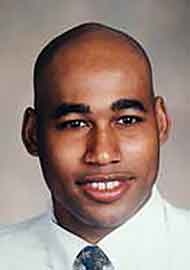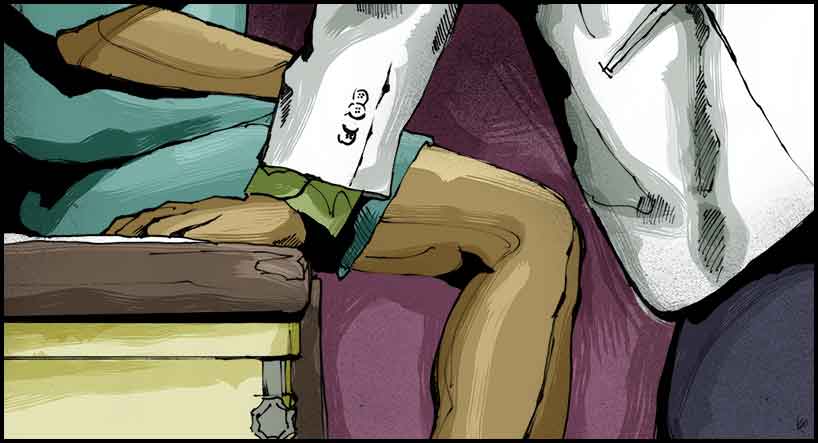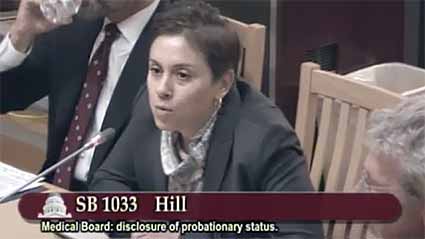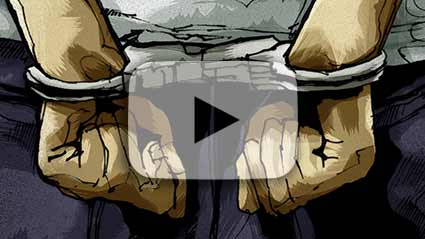
Dr. Mark Knight
Dr. Mark Knight calls himself an artist, one whose “gifted hands” sculpt bodies to perfection.
Sometimes, though, Knight’s hands strayed. So last year regulators placed the plastic surgeon from Southern California on probation for sexual misconduct with patients. He will be subject to restrictions on his practice and close monitoring until 2020.
But when patients come to his office for breast enlargements and tummy tucks, liposuction and eyelifts, Knight doesn’t have to tell them about his disciplinary status. Or about the woman he kissed while examining her surgical scars. Or the patient with whom he had sex on an examination table while her husband waited outside with their children.
And he doesn’t have to explain why an extra person is supposed to always be in the room: to make sure Knight doesn’t violate patients again.
Knight’s freedom to see patients without disclosing his tarnished record underscores the opaqueness of the physician discipline system across the United States, a national investigation by The Atlanta Journal-Constitution found.
The AJC identified more than 2,400 doctors disciplined for sexual misconduct involving patients since 1999. Half are still licensed.
Ryon Horne/AJC
» Video: Doctors & Sex Abuse: Our investigation so far
“There is a self-interested reason. That’s no excuse for not informing the patient.”
California Sen. Jerry Hill
But no state routinely requires doctors to tell patients when they have faced disciplinary action, the newspaper found. Four states post no disciplinary records online, and at least nine purge case files after as little as five years. Twenty-one states sometimes handle misconduct cases secretly and allow doctors to continue practice with no public hearings or public scrutiny.
To figure out that Knight is on probation in California, and why, a patient would have to find the state medical board’s website, click on “license verification,” type in the doctor’s name, choose the correct doctor from a list of physicians with similar names, scroll to the bottom of the next page to find a link to “administrative disciplinary actions,” click through to a documents page, then pick among three PDFs described only as “decision” or “order.” The third page of the first document finally contains the first reference to Knight’s sex offenses.
All this on a website that California calls “BreEZe.”
More in this series
- Gaps, cloaks and barriers: There are many reasons why you’ll never know if your doctor is a sex abuser
- Why doctors who sexually abuse patients go to therapy, return to practice
- No report, no justice: Doctors sexually abuse patients yet avoid police
- 6 ways abusive doctors may be restricted when they return to practice
- A broken system forgives sexually abusive doctors in every state
- In Georgia, doctor sanctioned 3 times for acts involving vulnerable patients still licensed
- Doctor’s reputation is no indicator of their likelihood to offend
- Medical profession condemns sexual abuse, but resists solutions
Cases like Knight’s loomed over a contentious effort to make California the first state requiring doctors to tell patients about being on probation. Consumer groups argued that patients deserve transparency from the physicians in whom they place so much trust.
“From a patient’s perspective, he just looks like a doctor practicing medicine,” said Lisa McGiffert, director of the Safe Patient Project, an affiliate of the advocacy group Consumers Union, which pushed the notification proposal. “But there is a big difference between a doctor on probation and a doctor not on probation.”
California seemed a good place to start a transparency campaign. About 100,000 doctors are licensed in California – one of every nine in the United States. At any time, 500 to 600 are on probation. And the state government’s nonpartisan research agency found that of the doctors placed on probation between 2011 and 2013, one in six already has committed another violation.
“There is absolutely no legitimate reason” to oppose disclosure, said state Sen. Jerry Hill, who sponsored a patient-notification bill this year. “There is a self-interested reason. That’s no excuse for not informing the patient.”
And yet, as Knight’s case shows and as Hill would learn in the legislature, when self-interest clashes with transparency, self-interest often wins.
‘Awkward situation’
Mark Anthony Knight launched his career as a plastic surgeon in the sprawling suburbs of Orange County, outside Los Angeles. By 2010 he owned a clinic called Eternal Youth MedSpa. His current medical practice markets cosmetic surgery to women seeking a new look after childbirth.
Knight’s website describes one package, involving simultaneous breast and abdominal procedures, as the “Mommy Makeover.” Breast enlargement coupled with “extreme abdominal reconstruction” is the “SuperMom Special.”
These operations are “a tribute to the wonderful women who have made our world a much better place,” the website says. “It is only fitting that we keep them looking and feeling as great as they are.”
That passage appears with a gallery of more than 30 before-and-after photographs of one patient. The woman, shown from the neck down, is nude. Close-ups highlight surgical enhancements to her breasts, her buttocks and her vagina.
Medical regulators opened an investigation of Knight after he performed liposuction and breast enlargement surgery on a 36-year-old in late 2007.
Two weeks after the procedures, Knight’s office canceled the woman’s appointment for a follow-up examination, according to medical board records. So she was surprised when, later the same day, Knight texted her to set up a late-afternoon office visit. When she arrived, everyone had left for the day, except Knight.

In the examination room, the woman told regulators, Knight asked her to undress. As they talked about whether her breasts were now too large, she said, Knight began massaging the liposuction scars on her abdomen. Then he leaned over and kissed her on the lips.
The patient said she pushed Knight away, but he kissed her again. When he tried a third time, she dressed and left.
From her home that evening, the woman texted Knight: “My view of our relationship is strictly doctor-patient. I would appreciate it if you didn’t come on to me like that again. You have made it a very awkward situation.”
Knight’s first reply was nonchalant.
“OK…I understand,” he wrote. “Have a great evening & enjoy ur wknd.”
But he texted her again six minutes later, with a different tone:
“It’s ok with me…still feeling down…need open heart surgery now.”
The patient never returned to Knight’s office.
“It was blatant. It was criminal, I thought.”
William Weathers, lawyer for a couple that filed a lawsuit against Dr. Mark Knight for his sexual exploits.
Public records do not indicate when the medical board received a complaint about Knight’s conduct. When another woman went to Knight for surgery a year later, she had no way of knowing about the first patient’s experience.
The 32-year-old woman had extensive scarring in her midsection after a hysterectomy and other procedures to treat ovarian cancer. In December 2008, hoping to minimize the scars, she went to Knight’s office for an outpatient procedure: an abdominoplasty, or tummy tuck.
The woman returned for three post-surgery exams. The third was scheduled late one day in January, just before closing time.
Knight’s office manager left shortly after the patient arrived. Her husband waited in the car with their children. She and Knight were alone.
What happened next is documented in medical board files and in a lawsuit the woman and her husband filed later.
After he told the woman to change into a robe, Knight left the room and returned several times. Finally, the woman said, Knight came in, pulled her close and kissed her on the lips. He lowered his pants, exposed his penis and, board records say, initiated intercourse.
Outside, her children needed to use the bathroom. When her husband brought them into the office, he heard moaning from an exam room. He looked inside and saw his wife on the table, naked. The doctor was standing between her legs.
Knight reached back to shut the door.
“I’m sorry,” he said. “I’m sorry.”
In their lawsuit, the woman and her husband said Knight exploited her “inner-most thoughts, feelings, fears and vulnerabilities.” The suit said Knight “forced himself” on the woman and described the episode as “sexual battery.”
“It was blatant,” the couple’s lawyer, William Weathers, said recently. “It was criminal, I thought.”
No charges were filed. Knight answered the woman’s lawsuit by claiming she “proximately caused” the sexual encounter.
Weathers said he dropped the suit because Knight no longer had medical malpractice insurance and was facing other legal claims. “The prospect of making any kind of recovery was not very good.”
Knight, 47, did not respond to emails and telephone messages requesting an interview. A man who answered Knight’s cellphone one day last month would not identify himself. After a reporter asked about the sexual-misconduct allegations against Knight, the man hung up and did not answer subsequent calls.
When Knight’s case went to the medical board in late 2010, brief news reports in Southern California said he surrendered his license rather than fight the charges.
But Knight’s deal with the board contained another, little-noted provision: As soon as the board would allow it, Knight could practice medicine again.
‘Better result’
By coincidence, not long after Knight gave up his license, California consumer advocates began noticing a pattern in medical board cases.
A pediatrician coaxed the mothers of 30 patients into letting him examine their feet for his sexual gratification. The medical board put him on probation and returned him to practice.
A dermatologist paid a patient for sex and gave her drugs to which she was already addicted. The board placed him on probation, too.
A psychiatrist had sex with a suicidal patient, paid $1,800 toward her breast-enlargement surgery and inappropriately prescribed narcotics. His punishment: probation.
California ordered these doctors to report their probation to hospitals where they had privileges and to their malpractice insurers – but not to patients.
In 2015, advocates working with the Safe Patient Project petitioned California’s medical board to require patient notification before every office visit. A doctor on probation would give each patient a one-page form that briefly stated his offense, and the patient would have to acknowledge receiving it. Nothing of the sort is required in any other state.
At a hearing in October, board members unanimously rejected the petition.
“You poison the well,” one board member, Dr. Randy Hawkins, said at the time. “You say, ‘This doctor has done something bad.’ Which gets in the way of the patient-physician relationship.”
The advocates hoped for better luck in California’s legislature.

California State Legislature
State Sen. Jerry Hill, who sponsored legislation to make California the first state to require doctors who are on probation to notify patients, made his final argument to other lawmakers on June 1.
Jerry Hill, a Democrat who represents much of Silicon Valley in the state Senate, introduced a patient-notification bill in February. From the start, he said, he knew medical lobbyists would fight it.
“They throw around a lot of money,” Hill said in an interview. “And they can play rough sometimes in elections.”
The California Medical Association has put almost $27 million into political campaigns since 1996, according to the National Institute on Money in State Politics, a nonpartisan research organization. The association has spent another $23.3 million on lobbying since 2002.
Up against strong opposition, Hill promoted his bill with emotional accounts from the victims of abusive doctors. When a Senate committee took up the bill in April, victims literally formed a line to tell their stories.
One woman said a plastic surgeon on probation for alcohol abuse botched her surgery, leaving her disfigured. If he had disclosed his record, she said, “I would not have chosen him.”
But medical organizations said the bill was unfair to doctors.

California State Legislature
Alecia Sanchez of the California Medical Association told a state Senate committee in April that a proposed patient-notification bill was unfair to doctors.
Many doctors agree to probation without admitting guilt, stipulating only that regulators might be able to prove the allegations, Alecia Sanchez, a medical association official, told the committee.
“Those physicians who are on probation because of a stipulated settlement have not had a hearing,” Sanchez said.
Sen. Hannah-Beth Jackson cut her off.
“Look,” she told Sanchez, “I’m a lawyer. You’re not going to persuade me. They have agreed to this because, in weighing the pros and cons, they feel the stipulation is a better result than if they proceed with a hearing.”
Six committee members unanimously endorsed the bill that day. It would need only 15 more votes to pass on the Senate floor.
‘Self-centered’
By early 2015, Mark Knight was trying to resume his practice. Surrendering his license, he told the medical board, had been “a wake-up call.”
“Why would this be a relevant issue for any patient he treats? It’s not going to happen again.”
Peter Osinoff, Dr. Mark Knight’s lawyer
When his patients accused him of sexual misconduct, he was experiencing “personal emotional upheaval,” an administrative law judge wrote. Knight’s brother had died of cancer, his daughter of sudden infant death syndrome. He and his wife separated, although they reconciled in 2008, before the second sexual misconduct episode.
Knight said he had changed during his exile. He told the judge he had devoted himself to his family and to assisting people in developing countries. He had recognized, the judge wrote, that “he had been completely self-centered,” focused on career and possessions.
Here, the judge inserted a footnote: Those possessions included the Ferrari that Knight wrecked while driving under the influence.
The judge said Knight “earned another chance” to practice, and recommended he get his license back. The board concurred.
Nothing in the board’s orders requires Knight to disclose his misconduct to patients. Knight’s lawyer, Peter Osinoff, said the doctor’s rehabilitation negates any need for disclosure.
“Why would this be a relevant issue for any patient he treats?” Osinoff said in an interview. “It’s not going to happen again.”
Besides, he said, “why should a doctor be required to essentially scare his patients away?”
‘Due process’
On June 1 in Sacramento, the state medical association issued a “Senate floor alert,” urging defeat of the patient-notification bill. The measure was “in direct violation of due process rights,” Laura Braden Quigley, the association’s vice president of communications, said in a recent statement. It “does nothing to increase patient safety and arbitrarily ignores most providers in the continuum of care.”
“To say we’re going to essentially undermine due process because the medical board isn’t doing its job is, I think, a mistake.”
Sen. Hannah-Beth Jackson, California
More than half a dozen of the association’s lobbyists stationed themselves just outside the Senate chamber while, inside, Jerry Hill made an impassioned argument for his bill.
Citing research that found one in six doctors on probation re-offend, Hill asked his colleagues: “Would you want your daughter, your son, your significant other, your parents – or your constituents – to be seen by that one, without their knowledge?”
Other lawmakers countered with a two-word mantra: due process.
Hannah-Beth Jackson, who had supported the bill in committee, spoke of “bad doctors” and a need to “clean up the profession.”
But:
“To say we’re going to essentially undermine due process because the medical board isn’t doing its job is, I think, a mistake,” she said. “We must allow due process to take place. … To shortcut it and to shortchange doctors undermines the integrity of our system of justice.”
The California Senate requires 21 votes – one more than half – to pass any bill. As the clerk called the roll on Hill’s measure, though, senator after senator was missing. The clerk called their names again. Most remained outside the chamber.
In the end, 15 senators voted yes, and 13 voted no. Twelve – nearly one-third – cast no vote at all.
The bill was dead.
For now, doctors like Mark Knight may disclose as much, or as little, as they choose.
On his website, Knight offers an explanation, of sorts, for his four-year absence from medicine. His version is highly selective, putting him in the best possible light, considering the circumstances.
He writes that he became “intimately involved with a woman who was my patient.” Then, he says, after the relationship was reported to the medical board, he retired from medicine.
Knight does not mention that the woman accused him of assaulting her. He says nothing about the other victim. He leaves out the medical board’s sanctions.
Instead, he says this:
“I have returned to the practice of medicine, having heeded these eternal words: ‘Physician, heal thyself.’ I have no arrogance, illusions, or ego intervening in the process of my patient care.
“I am human, just like you.”
Ryon Horne/AJC




